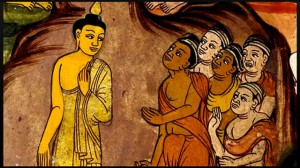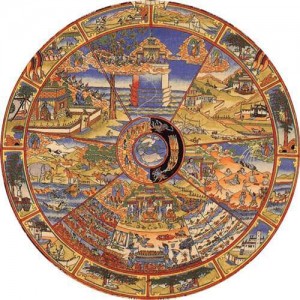The following is an excerpt from a teaching by Jetsunma Ahkon Lhamo called “Why P’howa”
There are certain preliminary teachings that must be taken into account, that must be part of our menu, in order to proceed into a deeper level of practice. Traditionally on the Buddhist path, these teachings are often heard again and again and again. It’s kind of interesting the way it happens. It will seem as though you will have absorbed and taken in certain preliminary teachings well enough to know them and recognize them, but the student will also notice that, upon getting ready to take on another deeper and more profound level of teaching or level of practice, they will always be given at least in a condensed form, those same preliminary teachings again and again. This is completely necessary, because in order to ready oneself for deeper levels of practice, in order to sort of tenderize the mind, soften the mind and prepare the mind in the same way that one plows a field in order to prepare it to receive a seed, we have to prepare our minds. And we have to think in a certain logical pathway in order to proceed to these deeper levels of teaching.
The thought behind that is that the deeper levels of teachings, and particularly the practice, will have no context if we don’t go through these certain preliminary ideas, certain preliminary passages, before we go further. Without context, there will be no deep understanding. In order for Dharma to be appropriate for the student, the student has to have accomplished what we call ‘turning the mind toward Dharma.’ Turning the mind toward Dharma means, actually, that we have stood back, in a sense, from our lives in order to gain some perspective with the help of someone who has, before us, stood back from their life in order to gain some perspective. Having stood back from our lives, we are able to look at cyclic existence and we are able to see our position in cyclic existence. We are able to see the situation of other sentient beings in cyclic existence and, having viewed all of that, we are able to understand then the problems associated with cyclic existence, literally the faults of cyclic existence.
Then, and only then, are we capable of turning away from cyclic existence. Literally it is somewhat like a love affair in the sense that we are infatuated with cyclic existence. Cyclic existence tricks us into showing us bright, shiny, feel-good things that cause us to react in a characteristic way, in the same way a new love affair would bring us a new toy to play with, something bright and shiny in our lives, something that we can say “Oh, things are not so bad! I have that!” That’s kind of how we think as human beings. We need a toy to play with, and for a very long time we become playful in samsara. We think of samsara as a toy much as a child would think of a bright and shiny object. In the same way that we do not always think our intimate love relationships through to the end, very rarely in fact, neither do we think samsara through to the end. So we are in love in a stupid childlike way, an unthinking way, an idiot way, with samsara, in the same way that many of the love affairs and infatuations that we have engaged in have been kind of stupid and unthinking and basically guided by bright lights or who knows what. We have no idea what makes us fall into the situations that we fall into.
At any rate, we have to address this problem of being in love with cyclic existence without being able to see what cyclic existence actually is. We cannot see its faults in the same way as in a new relationship if someone, an outsider who is knowledgeable, were to point out the fault of the relationship that one were engaged in, and even point out the fault of the beloved and, most of all, point out the fault of the interaction between oneself and the beloved. Of course you would not accept that information. You would reject it. In fact, you would kill the message bearer, literally. You would kill the message bearer in your mind. You would toss that out and that would be the end of it. So we have that kind of situation in our lives and it causes us to revolve in cyclic existence endlessly, unthinkingly, in a kind of rapture, kind of stupid-like, in a daze.
We also say that an appropriate way to understand our relationship with samsara is to think that we are drunk, that literally samsara is like a drug, like a narcotic. It dupes us in the same way that narcotics do. Narcotics cause us to not be aware of the pain. The same situation is going on, but we are not aware of the pain. If you think of having surgery or something like that —taking in first barbituates and another kind of drug in order to make that surgery less painful or to make it possible. Our relationship with samsara is very much like that. You may be asleep and you may not know that you are feeling the pain; but actually the way barbituates work, in fact, you are feeling the pain, but it’s blocked off from the part of your brain that registers that in a way where you can react to it. So, in fact, you are feeling the pain and, in fact, you are under the knife. Surgically you are being cut open and your parts are laying out on the table; but to you, that’s not an uncomfortable experience. In fact, surgery seems quite a wonderful thing because you go to sleep and you wake up and it’s all finished. You weren’t there. It was neat and clean. You have no idea whether you had respiratory arrest or cardiac arrest or ingrown toenails or any of your teeth fell out. You have no idea what happened to you while you were on that table, and that’s because of the influence of the narcotic.
A narcotic makes us approach things that can be not only detrimental to our health and well-being, but can literally kill us—to make us even approach our own death with a calm mind. But a calm mind not in a smart way. A calm mind would be literally a prepared mind, ready to go through a door that we have rehearsed going through and we know how to go through. In this way, we have a drunk mind, a mind that is incapable of feeling anything besides the kind of delusion and calm that goes with narcotics. And that’s how our relationship with samsara is right now.
Copyright © Jetsunma Ahkon Norbu Lhamo All rights reserved








